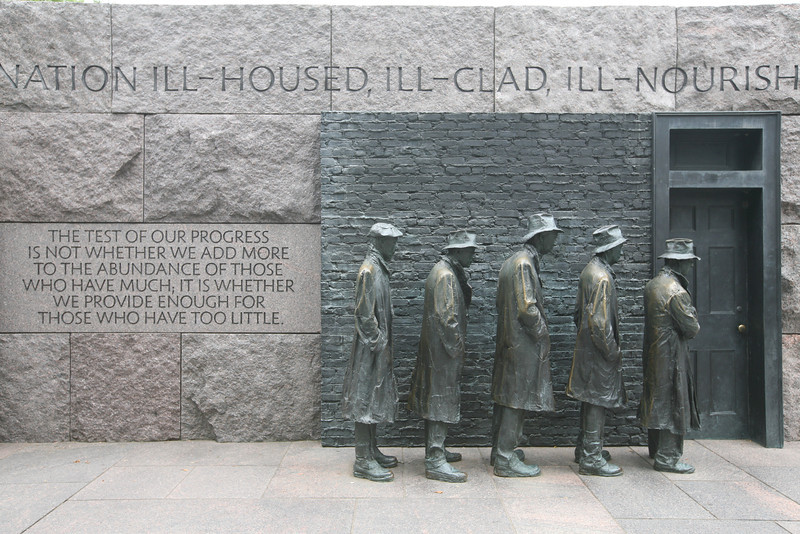The test of our progress is not whether we add more to the abundance of those who have much, it is whether we provide enough for those who have too little.
Franklin D. Roosevelt
 Just as there are many definitions of justice, so how we enter into and engage the issues and works of justice vary. I believe that our engagement depends on our understandings. Consider these quotations from two different American Presidents. Ronald Reagan declared that his philosophy of life “is that if we make up our mind what we are going to make of our lives, then work hard toward that goal–we never lose. Somehow we win.” This philosophy of life is based on a sense of justice that sees everyone as equal, with equal opportunity being either equally free from obstacles or equally hindered by the same obstacles. The difference is in personal mind-making attitude. It is the kind of philosophy that plays into a popular American genre related to the Puritan work ethic: if you work hard, you will be successful. You will make progress. We know now, three decades later, that many of his policies helped create obstacles to progress for many people. Trickle down economics didn’t trickle down.
Just as there are many definitions of justice, so how we enter into and engage the issues and works of justice vary. I believe that our engagement depends on our understandings. Consider these quotations from two different American Presidents. Ronald Reagan declared that his philosophy of life “is that if we make up our mind what we are going to make of our lives, then work hard toward that goal–we never lose. Somehow we win.” This philosophy of life is based on a sense of justice that sees everyone as equal, with equal opportunity being either equally free from obstacles or equally hindered by the same obstacles. The difference is in personal mind-making attitude. It is the kind of philosophy that plays into a popular American genre related to the Puritan work ethic: if you work hard, you will be successful. You will make progress. We know now, three decades later, that many of his policies helped create obstacles to progress for many people. Trickle down economics didn’t trickle down.
Franklin D. Roosevelt saw exactly how too many in the America of the Great Depression were sinking into poverty and despair regardless of how hard they worked. His understanding of progress focused on the most vulnerable in society and sought ways to change and create systems that gave people a way toward stability and security. My own grandparents benefited from his National Housing Act which made low interest loans available for home purchases–even building simple homes that people could afford. My grandparents bought one of these homes in rural north Alabama and over the years were able to open a business, add on their house, and buy additional land around their home on which they grew their own vegetables and kept chickens, goats and a cow. I grew up on that land. I enjoyed the safety and security that they were able to create and share with my parents because a President had a vision of progress that began with the most vulnerable. And I know this: FDR’s programs and progress were far more open to white people than black people in those days, especially in the South. There was far more justice work to do than FDR’s programs could address.
Relational justice does that. It is grounded in reality. It builds on relationships. It measures itself by how it responds to the most vulnerable, and it constantly asks about unintended consequences and vulnerable people who have not yet been included. Ultimately, the vision and goal of relational justice is that all people have what they need to survive and thrive.
Bob Patrick

Well said, Bob.